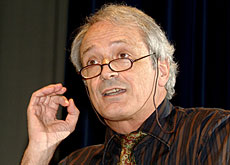
Cancer specialist takes on international role

Swiss oncologist Franco Cavalli has taken over the presidency of the International Union Against Cancer, which is holding its annual congress in Washington.
This is just the latest challenge for the head of the Oncology Institute of Southern Switzerland, whose professional life has been divided between medical care and politics.
Cavalli has always been a creative force to be reckoned with. At age 36, he began developing an oncology programme in canton Ticino, at a time when the local hospital didn’t even have a cancer ward.
A member of parliament for the centre-left Social Democrats, Cavalli wears his idealism on his sleeve and has never been afraid of stating his views, even if it has made him some enemies along the way.
But his politics have also allowed him to see beyond his homeland. In the 1980s, for example, the lymphoma specialist helped promote cancer projects in Nicaragua.
swissinfo: Ticino has become a world-renowned centre of excellence for research and the fight against cancer. How has this been possible?
Franco Cavalli.: It was a combination of good luck and a set of favourable circumstances. First of all, there was no university in canton Ticino and more importantly there was no medical faculty that could have put a spanner in the works.
It’s no coincidence that the two centres which have done the most to further research into new treatments for tumours have been Ticino and St Gallen, neither of which have a medical faculty.
I was also lucky to have first-class colleagues from Italy who found in Ticino an ideal place to conduct research without having to emigrate overseas.
From the outset I also established a structure throughout the canton that made it possible to reach a critical mass.
Today, our institute helps 400,000 people in Switzerland. And thanks to our connections in Italy we can actually help several million people.
swissinfo: How do you rate research policy in Switzerland?
F.C.: Research in Switzerland is very good, especially at the laboratory level, where the results are excellent and up to international standards. The weak link is clinical research.
This is due largely to the medical faculties that have not realized that the world has changed. Another factor is the financial power of the “medical barons” who have not been able or willing to create new structures needed for research.
swissinfo: What is your view of the Swiss healthcare system?
F.C.: The Swiss healthcare system is certainly very good. But it is too expensive for what it produces, and too wasteful. The way it is funded is also unfair, because it places too great a burden on the less wealthy.
Waste and high costs will, in the long run, undermine our healthcare system and it will eventually have to undergo a fundamental overhaul. We are struggling with an unmanageable situation and what is clearly a two-tier medical system.
swissinfo: Idealism underlies your activities in Central America. How did this get started?
F.C.: Vietnam and Algeria both played a fundamental role in the process of politicisation I went through. Then circumstances took me to Nicaragua in 1985, where a state of emergency was in place.
[Today] my aim is to expand the fight against Aids and to be involved in major changes in Latin America.
swissinfo: How do you manage to reconcile the roles of doctor, politician, advocate for developing nations and father?
F.C.: There are days when I feel as though I have too heavy a load, and there are days when I can fly off the handle because I have so many – too many – things to do.
But generally, I don’t feel as though I live in a constant state of stress. Of course, it’s important to be well organized both mentally and in terms of how you manage your time. What really counts is being able to delegate with confidence.
swissinfo: Which is the most difficult role?
F.C.: Being a father. There are so many questions and, at times, I ask myself whether I have done everything I could. Whether I made the right decisions, whether I explored all the options.
In politics, you can make mistakes but they are then forgotten. With your patients, you obviously have to give them your full attention. But when you make a mistake with your children, the mental anguish is far greater.
swissinfo, Françoise Gehring in Bellinzona
Franco Cavalli has been the head of the Oncology Institute of Southern Switzerland since 2003.
He divides his time between hospitals, his family – seven children – and politics. In 1995 he was elected to parliament on behalf of the Social Democratic Party, and was head of the parliamentary faction between 1999 and 2002.
Cavalli received his training in internal medicine and oncology in Bern, Milan, Brussels and London. He is the author and co-author of over 400 scientific articles and four books.
On July 7, he took over as president of the International Union Against Cancer, a non-governmental association with 270 member organisations in over 80 countries.
Franco Cavalli was born in Locarno in 1942.
Since 1978 he has been Head of Medical Oncology at the San Giovanni hospital in Bellinzona.
In 1981 he launched the International Conference on Malignant Lymphoma in Lugano, the world’s leading forum in this field.

In compliance with the JTI standards
More: SWI swissinfo.ch certified by the Journalism Trust Initiative





























You can find an overview of ongoing debates with our journalists here . Please join us!
If you want to start a conversation about a topic raised in this article or want to report factual errors, email us at english@swissinfo.ch.